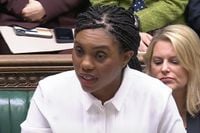On May 6, 2025, the UK government announced a groundbreaking trade deal with India, projected to boost the British economy by £5 billion annually. However, the announcement has sparked significant controversy, particularly around tax implications for Indian workers. Critics, including Conservative leader Kemi Badenoch and Reform UK leader Nigel Farage, have raised concerns that the deal could lead to a situation where Indian workers pay less tax than their British counterparts for the same jobs.
At the heart of the controversy is the Labour government’s agreement to exempt Indian workers and companies from national insurance contributions for those in the UK for less than three years. This provision has been labeled as a “two-tier tax arrangement” by opponents, who argue it undermines British workers.
Sir Keir Starmer, the Prime Minister, defended the deal in the House of Commons, dismissing the criticisms as “incoherent nonsense.” He emphasized that similar reciprocal agreements exist with over 50 other countries, challenging opponents to clarify whether they would also scrap those agreements. Starmer stated, “The criticism on the double taxation is incoherent nonsense. It’s a benefit to working people.” He characterized the deal as a “huge win” for the UK.
The trade deal is touted as the largest post-Brexit agreement for Britain, potentially adding £4.8 billion to the economy by 2040. Under its terms, UK workers in India would continue to pay into their own national insurance system but would be exempt from Indian contributions, while Indian workers in the UK would pay into their own system without contributing to the British system for three years.
Business Secretary Jonathan Reynolds supported the deal, asserting that it would not undercut British workers. He pointed to similar arrangements with the EU, US, Canada, and Japan, arguing that the agreement would ultimately lead to increased tax revenue for the UK Treasury. Reynolds stated, “This is not a tangible issue. This is the Conservatives – and Reform – unable to accept that this Labour Government has done what they couldn’t do and get this deal across the line.”
Despite the government’s assurances, the deal has faced backlash from various quarters. Kemi Badenoch accused the Labour government of failing to protect British workers, asserting that the arrangement would subsidize Indian labor while undermining local jobs. “This is total and utter rubbish,” she said, referring to the claims that the deal would benefit British workers.
Furthermore, the controversy intensified when Indian officials accused Badenoch of spreading misinformation regarding her past negotiations on the trade deal. They claimed that she had previously offered two years of national insurance relief to Indian workers, which she denied, labeling the reports as “fake news.” This exchange has added another layer of complexity to the already contentious political landscape surrounding the deal.
In addition to the trade deal discussions, the UK government is facing scrutiny over its stance on arms sales to India amid escalating tensions with Pakistan. Business Secretary Reynolds suggested that the UK should not be “squeamish” about selling arms to India, which has recently conducted missile strikes in response to a terror attack in Kashmir. This comment has drawn criticism, as it raises ethical questions about the UK’s role in international conflicts.
As the debate continues, Downing Street has been unable to provide concrete estimates regarding the potential impact of the trade deal on immigration or tax revenue. A spokesperson stated, “We don’t do individual line-by-line assessments on free trade deals,” emphasizing that the overall impact is expected to be positive.
With the political landscape shifting rapidly, the Labour government is also grappling with internal pressures. Following disappointing results in local elections, some Labour MPs have called for a reversal of cuts to winter fuel payments, arguing that the government needs to listen to its constituents. Starmer has faced criticism from within his party, with Red Wall MPs urging immediate action to address these concerns.
Meanwhile, the Reform UK party is gaining traction in Scotland, with recent polls suggesting it could become the second-largest party in Holyrood. This shift reflects a broader trend of discontent with traditional political parties, as voters seek alternatives amid economic uncertainty.
As discussions about the UK-India trade deal unfold, the implications for British workers, the economy, and international relations remain at the forefront of public discourse. The government’s ability to navigate these challenges will be critical in shaping its future and maintaining public trust.
In summary, the UK-India trade deal represents a significant milestone for the British government, but it is not without its challenges. As the political fallout continues, the government must address the concerns raised by critics while also capitalizing on the potential economic benefits of the agreement. The coming weeks will be crucial in determining the long-term impact of this landmark deal on the UK’s economy and its relationship with India.


